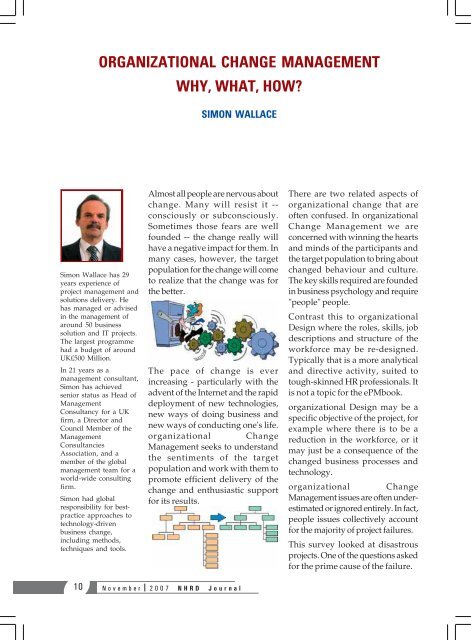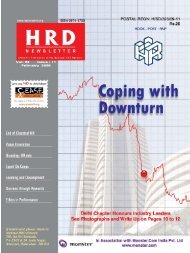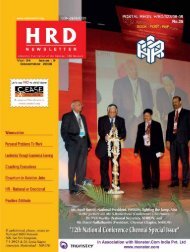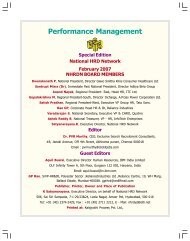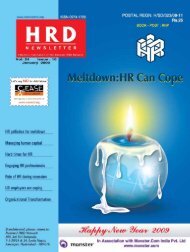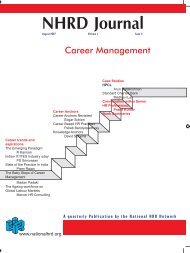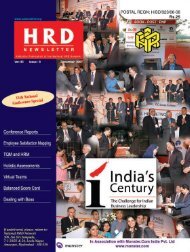NHRD Journal - National HRD Network
NHRD Journal - National HRD Network
NHRD Journal - National HRD Network
You also want an ePaper? Increase the reach of your titles
YUMPU automatically turns print PDFs into web optimized ePapers that Google loves.
ORGANIZATIONAL CHANGE MANAGEMENT<br />
WHY, WHAT, HOW?<br />
SIMON WALLACE<br />
Simon Wallace has 29<br />
years experience of<br />
project management and<br />
solutions delivery. He<br />
has managed or advised<br />
in the management of<br />
around 50 business<br />
solution and IT projects.<br />
The largest programme<br />
had a budget of around<br />
UK£500 Million.<br />
In 21 years as a<br />
management consultant,<br />
Simon has achieved<br />
senior status as Head of<br />
Management<br />
Consultancy for a UK<br />
firm, a Director and<br />
Council Member of the<br />
Management<br />
Consultancies<br />
Association, and a<br />
member of the global<br />
management team for a<br />
world-wide consulting<br />
firm.<br />
Simon had global<br />
responsibility for bestpractice<br />
approaches to<br />
technology-driven<br />
business change,<br />
including methods,<br />
techniques and tools.<br />
Almost all people are nervous about<br />
change. Many will resist it --<br />
consciously or subconsciously.<br />
Sometimes those fears are well<br />
founded -- the change really will<br />
have a negative impact for them. In<br />
many cases, however, the target<br />
population for the change will come<br />
to realize that the change was for<br />
the better.<br />
The pace of change is ever<br />
increasing - particularly with the<br />
advent of the Internet and the rapid<br />
deployment of new technologies,<br />
new ways of doing business and<br />
new ways of conducting one's life.<br />
organizational Change<br />
Management seeks to understand<br />
the sentiments of the target<br />
population and work with them to<br />
promote efficient delivery of the<br />
change and enthusiastic support<br />
for its results.<br />
There are two related aspects of<br />
organizational change that are<br />
often confused. In organizational<br />
Change Management we are<br />
concerned with winning the hearts<br />
and minds of the participants and<br />
the target population to bring about<br />
changed behaviour and culture.<br />
The key skills required are founded<br />
in business psychology and require<br />
"people" people.<br />
Contrast this to organizational<br />
Design where the roles, skills, job<br />
descriptions and structure of the<br />
workforce may be re-designed.<br />
Typically that is a more analytical<br />
and directive activity, suited to<br />
tough-skinned HR professionals. It<br />
is not a topic for the ePMbook.<br />
organizational Design may be a<br />
specific objective of the project, for<br />
example where there is to be a<br />
reduction in the workforce, or it<br />
may just be a consequence of the<br />
changed business processes and<br />
technology.<br />
organizational Change<br />
Management issues are often underestimated<br />
or ignored entirely. In fact,<br />
people issues collectively account<br />
for the majority of project failures.<br />
This survey looked at disastrous<br />
projects. One of the questions asked<br />
for the prime cause of the failure.<br />
10<br />
November 2007 <strong>N<strong>HRD</strong></strong> <strong>Journal</strong>


